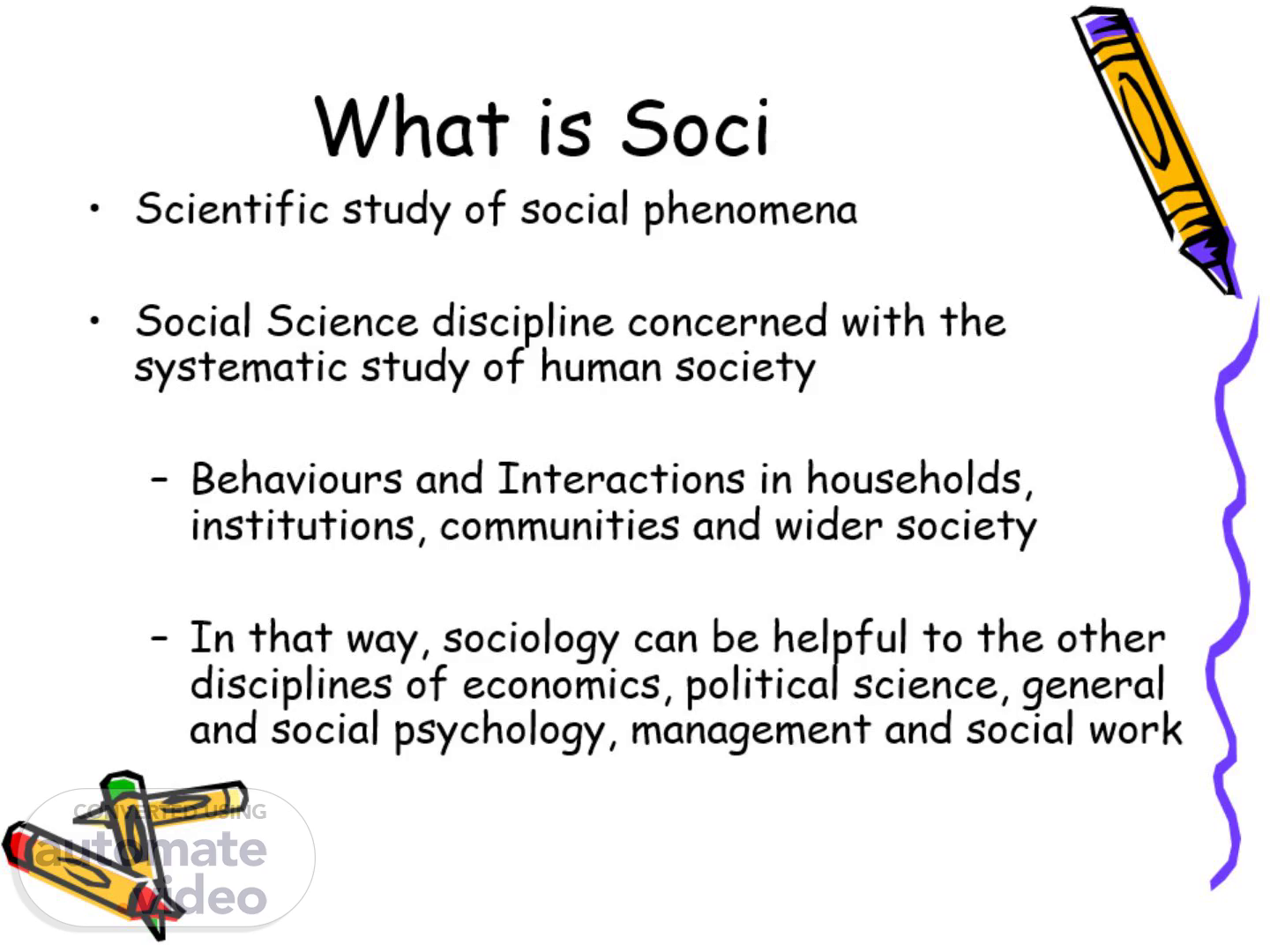Page 1 (0s)
What is Sociology. Scientific study of social phenomena Social Science discipline concerned with the systematic study of human society Behaviours and Interactions in households, institutions, communities and wider society In that way, sociology can be helpful to the other disciplines of economics, political science, general and social psychology, management and social work.
Page 2 (16s)
Why is Sociology Necessary?. Allows for investigation of how social forces or phenomena influence/affect behaviour Macionis and Plummer assert that “Sociology’s basic insight is that where we are placed in a society profoundly affects individual experiences.” Translated, this means that our geographical location, social class position, culture, for eg., have the potential to affect our life chances as individuals and nations. Sociology helps us to see that and to examine it..
Page 3 (38s)
Importance of Sociology. Systematic study of social phenomena (including problems) Understanding problems of social exclusion and marginalization Investigating and understanding social crises Explaining social responses to poverty, exclusion, marginalization, prejudice and discrimination.
Page 4 (51s)
Social Problems. Crime, violence and anti-social behaviour Poverty Injustice, social exclusion and marginalization Teenage Pregnancy & Adolescent Parenting High Risk Behaviours HIV/AIDS Unemployment Street and Working Children Domestic Violence and Abuse Pedophilia Incest Carnal Abuse.
Page 5 (1m 4s)
Contributions of Sociology. Research and Investigation Social Policy Formulation Monitoring and Evaluation Advocacy and Change.
Page 6 (1m 13s)
Emergence of Sociology as a Discipline. *Emerged in the West during the C19th * In many ways, it was a product of the Enlightenment and was influenced by philosophers such as Montesquieu, Rousseau and Voltaire..
Page 7 (1m 25s)
Emergence of Sociology as a Discipline. The worldview of the Enlightenment highlighted: Rationality and reason Empiricism – the need for facts Science Progress Universalism – general laws.
Page 8 (1m 35s)
Two Positions: Positivist and Humanist Traditions.
Page 9 (1m 50s)
Two Positions: Positivist and Humanist Traditions.
Page 10 (2m 4s)
Key Thinkers in Sociology. Auguste Comte: Key idea: The study of sociology is a science. As such, society conforms to laws. He was interested in how society was held together (social statics) and how society changes (social dynamics)..
Page 11 (2m 19s)
Thinkers in Sociology. Ferdinand Toennies: Key idea: produced the theory of Gemeinschaft and Gesellschaft. He saw the modern world as the progressive loss of gemeinschaft, or human community. In contrast, industrial society is impersonal and self-interest reigns, a condition he dubbed gesellschaft..
Page 12 (2m 34s)
KeyThinkers in Sociology. Herbert Spencer: Key idea: the passing of time witnesses the survival of the fittest. This came to be known as social Darwinism – the idea that if left to compete amongst themselves, the most intelligent, ambitious and productive people will eventually dominate..
Page 13 (2m 50s)
Key Thinkers in Sociology. Emile Durkheim: His work was primarily concerned with the issue of social solidarity, of how societies “hang together.” Societies moved from mechanical (marked by similarities and intimate social relations) to organic society (marked by increased differentiation and division of labour..
Page 14 (3m 5s)
KeyThinkers in Sociology. Talcott Parsons: He was the major US proponent of the functionalist perspective. Talcott treated society like a system, identifying basic tasks that all societies must perform to survive. All societies must be able to adapt, achieve their goals, maintain themselves and have well-socialized members..
Page 15 (3m 21s)
KeyThinkers in Sociology. Max Weber – He saw societies as becoming increasingly dominated by rational thought. He highlighted the growth of bureaucracies, which have brought some benefits but also increasing disenchantment. Weber was concerned with how human actions and meanings played their role in social life..
Page 16 (3m 36s)
KeyThinkers in Sociology. Karl Marx: “The history of all hitherto existing societies is the history of class struggle.” He did not only seek to understand society. Marx asserted, “The philosophers have only interpreted the world, in various ways; the point is to change it.”.
